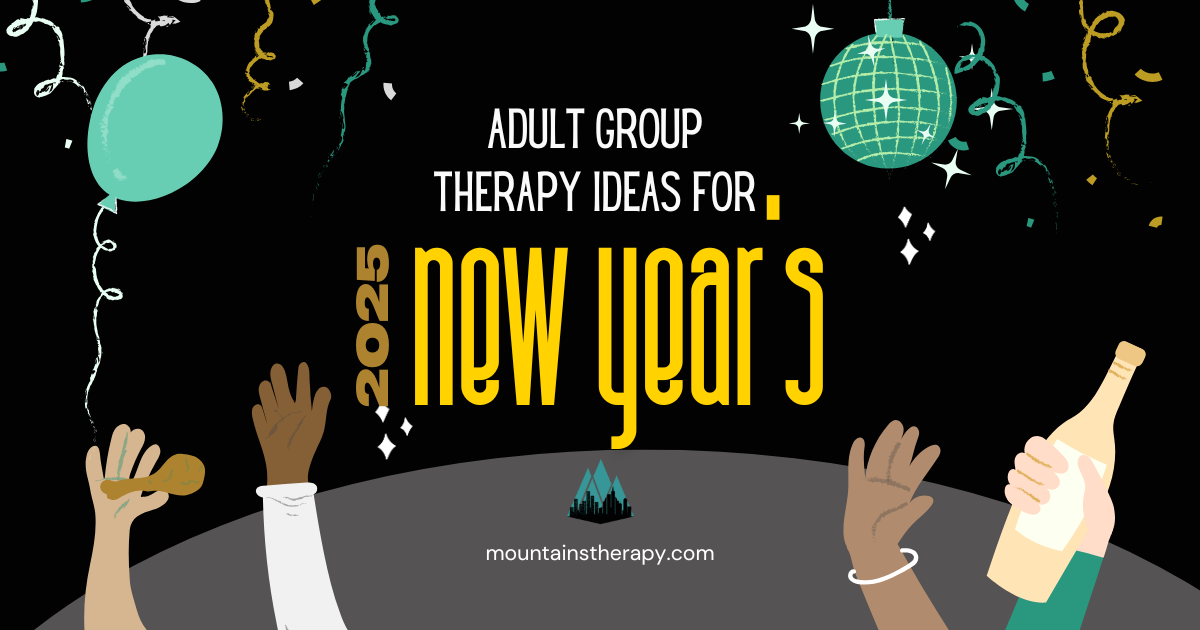Adult Group Therapy Ideas for New Year's Eve and New Year's Day
Learn more about our therapy and counseling Services, Specialties and Treatment approaches.
In This Blog, You’ll Learn:
- Engaging activities for New Year’s Eve and New Year’s Day therapy sessions
- Therapeutic approaches behind each activity
- Goals of each activity and how they support emotional well-being
- Instructions for implementing each activity
New Year’s Eve: Reflect and Connect
Reflective activities encourage closure and connection as the year ends.
1. Gratitude Circle
- Therapeutic Approach: Mindfulness-Based Stress Reduction (MBSR)
- Goal: Cultivate gratitude and presence in the moment.
- How It Helps: Reflecting on positives reduces stress and builds emotional resilience.
Instructions:
- Arrange the group in a circle.
- Provide a talking stick or object to pass around.
- Each person shares one thing they are grateful for from the past year.
- Optionally, compile all gratitude statements into a group list to reflect on afterward.
2. Memory Collages
- Therapeutic Approach: Art Therapy
- Goal: Encourage self-expression and reflection on personal growth.
- How It Helps: Visualizing meaningful moments helps participants process and share experiences.
Instructions:
- Provide magazines, scissors, markers, glue, and large sheets of paper.
- Ask participants to cut out images or words representing meaningful moments or lessons from the year.
- Allow 30-40 minutes for creation.
- Facilitate a discussion where participants share their collages and explain their choices.
3. Letting Go Ritual
- Therapeutic Approach: Acceptance and Commitment Therapy (ACT)
- Goal: Release emotional baggage and foster acceptance of the past.
- How It Helps: Writing and symbolic actions encourage emotional release.
Instructions:
- Distribute small slips of paper and pens.
- Ask participants to write down things they want to let go of from the past year.
- Collect the papers and place them in a “letting go” jar or shredder.
- Facilitate a discussion on how it feels to release those burdens.
4. Year in Review Jenga
- Therapeutic Approach: Narrative Therapy
- Goal: Reflect on and reframe personal stories from the past year.
- How It Helps: Encourages self-awareness and sharing within the group.
Instructions:
- Write reflective prompts (e.g., “A challenge you overcame”) on Jenga blocks.
- Participants take turns pulling blocks and answering the prompts.
- Continue until all blocks have been pulled or time is up.
5. Strengths Swap
- Therapeutic Approach: Positive Psychology
- Goal: Build self-esteem and connection.
- How It Helps: Promotes mutual appreciation and belonging.
Instructions:
- Give each participant a notecard.
- Instruct them to write down one strength they see in another group member.
- Pass the cards to the respective members and read aloud.
- Reflect as a group on how recognizing strengths enhances self-esteem.
New Year’s Day: Intentions and Growth
Forward-thinking activities help participants embrace hope and purpose for the new year.
1. Vision Boards
- Therapeutic Approach: Cognitive Behavioral Therapy (CBT)
- Goal: Visualize and plan for achievable goals.
- How It Helps: Encourages focus on desired outcomes and action planning.
Instructions:
- Provide poster boards, magazines, markers, scissors, and glue.
- Ask participants to cut out images and words that represent their goals.
- Allow 30-40 minutes for creation.
- Share boards in a group discussion about future aspirations.
2. Group Affirmation Crafting
- Therapeutic Approach: Solution-Focused Therapy
- Goal: Build positive self-talk and group cohesion.
- How It Helps: Reinforces hope and creates a collective sense of purpose.
Instructions:
- Brainstorm affirmations as a group, writing ideas on a whiteboard.
- Choose 5-10 affirmations to finalize.
- Write affirmations on a large poster or distribute copies to each participant.
3. Self-Care Resolutions
- Therapeutic Approach: Dialectical Behavior Therapy (DBT)
- Goal: Promote mindfulness and balance in daily life.
- How It Helps: Empowers participants to prioritize their well-being.
Instructions:
- Distribute worksheets or blank paper.
- Guide participants to brainstorm self-care activities they can implement.
- Share resolutions within the group to build accountability.
4. Intentions Jar
- Therapeutic Approach: Motivational Interviewing (MI)
- Goal: Set and share meaningful intentions for the year.
- How It Helps: Builds accountability and group support.
Instructions:
- Provide slips of paper and pens.
- Have participants write down one intention for the year.
- Place intentions in a jar and read them aloud anonymously.
- Discuss the themes and aspirations that arise.
5. Values Walk Discussion
- Therapeutic Approach: Acceptance and Commitment Therapy (ACT)
- Goal: Align goals with core values.
- How It Helps: Encourages participants to reflect on their authentic selves.
Instructions:
- Write core values on large pieces of paper and spread them around the room.
- Ask participants to stand by the value that resonates most with their goals.
- Facilitate a discussion about why they chose that value and how it connects to their intentions.
6. Resilience Bingo
- Therapeutic Approach: Resilience Training
- Goal: Recognize strengths and coping mechanisms.
- How It Helps: Sparks group discussion and mutual encouragement.
Instructions:
- Create bingo cards with resilience-based actions (e.g., “Tried something new,” “Practiced self-care”).
- Distribute cards and have participants share examples to mark off squares.
- The first person to get a bingo shares their reflections on their resilience journey.
Make the New Year Meaningful
The activities above integrate therapeutic approaches with engaging exercises to create a supportive group environment. At Mountains Therapy NJ, we specialize in fostering growth, balance, and healing. Begin your year with purpose and connection—explore how group therapy can help you thrive in 2025.











